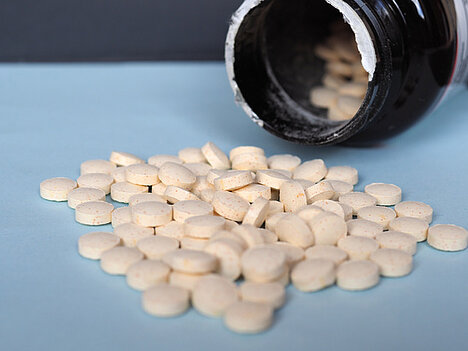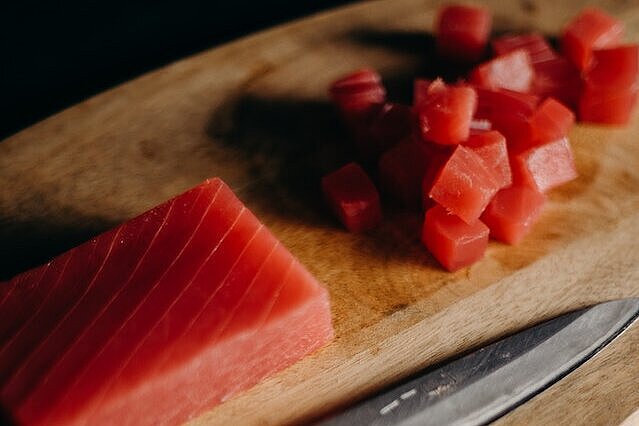Biotin

Biotin is an important vitamin for the health of dogs. It is also known as vitamin H or vitamin B7 and is involved in many metabolic and cell division processes in the body. Biotin has a particularly positive effect on your dog's skin and coat, but also on other aspects such as nerve function and the regulation of blood sugar levels. In this article, you can find out more about biotin for dogs: what it is, what advantages and disadvantages it has and how to give it to your dog correctly.
What is biotin?
Biotin is a water-soluble vitamin from the group of B vitamins. It is produced by bacteria in the intestine, but is also absorbed through food. Biotin is involved in the utilization of carbohydrates, fats and proteins and helps in the formation of fatty acids and amino acids. It also supports cell division and the growth of skin, hair and nail cells.
What are the benefits of biotin for dogs?
Biotin can bring many benefits to your dog, especially if he suffers from skin or coat problems. Biotin can have the following positive effects
- Improve the appearance of the skin and relieve itching
- Promote a shiny coat and healthy undercoat
- Prevention or treatment of hair loss or brittle hair
- Strengthening the claw structure
- Supporting nerve and immune function
- Regulation of blood sugar levels in diabetes mellitus
What are the side effects of biotin for dogs?
Biotin generally has no negative side effects for dogs, as it is water-soluble and excess biotin is excreted in the urine. However, an overdose of biotin can lead to an imbalance of other vitamins, especially vitamin B5 (pantothenic acid).
How do I dose biotin correctly for my dog?
The correct dosage of biotin for your dog depends on its body weight and state of health. On average, a dog needs about 2 micrograms of biotin per kilogram of body weight per day. This means that a 10 kg dog needs 20 micrograms of biotin per day to avoid a deficiency. However, if your dog has skin or coat problems or suffers from diabetes mellitus, its biotin requirement may be higher. In this case, you should consult your vet to determine the optimal dosage for your dog.
Biotin is available in various dosage forms, for example as a tablet, powder or liquid. You can either give biotin directly into the mouth or mix it into the food. Make sure that you do not exceed the recommended dosage, as this can lead to an imbalance with other vitamins.
Which foods contain biotin?
Biotin is found in many natural foods that you can give your dog as part of a balanced diet. Foods containing biotin are
- Liver (beef or poultry)
- egg yolk
- yeast
- nuts
- dairy products
- salmon
- carrots
- spinach
However, these foods contain different amounts of biotin and may lose more or less biotin depending on how they are prepared. In addition, some foods may contain other substances that can inhibit the absorption of biotin. These include, for example, raw egg white (avidin) or soy products (isoflavones).
Biotin is a vitamin that is essential for your dog's health. It has a positive effect on your dog's skin and coat as well as other aspects such as nerve function and blood sugar levels. To prevent or treat a biotin deficiency, you should give your dog food containing biotin and, if necessary, a suitable dietary supplement.
Properties 14
Are you looking for other ingredients with a specific property?
Just click on them to find more.
If you notice any signs of hypersensitivity or poisoning in your dog, you should see your vet immediately. We are not a substitute for a vet, but we try to be as accurate as possible. Every dog reacts differently and we recommend you get a second opinion or consult your vet if in doubt.
Stay healthy and take good care of your four-legged friend!😊
Similar to Biotin
The optimum amount of folic acid for your dog depends on various factors such as age, size, state of health and diet. As a rule of thumb, dogs need around 0.08 to 0.18 milligrams of folic acid per...
The exact amount of vitamin B12 a dog needs depends on various factors, such as the dog's age, size, breed and state of health. A general recommendation is that an adult dog needs about 20...
Vitamin B3 is one of the water-soluble B vitamins that the body cannot store or can only store to a limited extent. Vitamin B3 must therefore be taken in regularly through food. Vitamin B3 is...
Vitamin B2 or riboflavin is one of the eight B vitamins that are essential for the smooth running of numerous metabolic processes in the body. It is involved in the conversion of food into energy,...



